- Home
- Nathaniel Hawthorne
The Blithedale Romance Page 6
The Blithedale Romance Read online
Page 6
“Do you know Hollingsworth personally?” I inquired.
“No; only as an auditor-auditress, I mean—of some of his lectures,” said she. “What a voice he has! And what a man he is! Yet not so much an intellectual man, I should say, as a great heart; at least, he moved me more deeply than I think myself capable of being moved, except by the stroke of a true, strong heart against my own. It is a sad pity that he should have devoted his glorious powers to such a grimy, unbeautiful, and positively hopeless object as this reformation of criminals, about which he makes himself and his wretchedly small audiences so very miserable. To tell you a secret, I never could tolerate a philanthropist, before. Could you?”
“By no means,” I answered; “neither can I now!”
“They are, indeed, an odiously disagreeable set of mortals,” continued Zenobia. “I should like Mr. Hollingsworth a great deal better, if the philanthropy had been left out. At all events, as a mere matter of taste, I wish he would let the bad people alone, and try to benefit those who are not already past his help. Do you suppose he will be content to spend his life-or even a few months of it—among tolerably virtuous and comfortable individuals, like ourselves?”
“Upon my word, I doubt it,” said I. “If we wish to keep him with us, we must systematically commit at least one crime apiece! Mere peccadillos will not satisfy him.”
Zenobia turned, sidelong, a strange kind of a glance upon me; but, before I could make out what it meant, we had entered the kitchen, where, in accordance with the rustic simplicity of our new life, the supper-table was spread.
IV
THE SUPPER-TABLE
THE PLEASANT firelight! I must still keep harping on it.
The kitchen-hearth had an old-fashioned breadth, depth, and spaciousness, far within which lay what seemed the butt of a good-sized oak-tree, with the moisture bubbling merrily out of both ends. It was now half-an-hour beyond dusk. The blaze from an armfull of substantial sticks, rendered more combustible by brush-wood and pine, flickered powerfully on the smoke-blackened walls, and so cheered our spirits that we cared not what inclemency might rage and roar, on the other side of our illuminated windows. A yet sultrier warmth was bestowed by a goodly quantity of peat, which was crumbling to white ashes among the burning brands, and incensed the kitchen with its not ungrateful fragrance. The exuberance of this household fire would alone have sufficed to bespeak us no true farmers; for the New England yeoman, if he have the misfortune to dwell within practicable distance of a wood-market, is as niggardly of each stick as if it were a bar of California gold.
But it was fortunate for us, on that wintry eve of our untried life, to enjoy the warm and radiant luxury of a somewhat too abundant fire. If it served no other purpose, it made the men look so full of youth, warm blood, and hope, and the women— such of them, at least, as were anywise convertible by its magic —so very beautiful, that I would cheerfully have spent my last dollar to prolong the blaze. As for Zenobia, there was a glow in her cheeks that made me think of Pandora, fresh from Vulcan’s workshop, and full of the celestial warmth by dint of which he had tempered and moulded her.17 “Take your places, my dear friends all,” cried she; “seat yourselves without ceremony—and you shall be made happy with such tea as not many of the world’s working-people, except yourselves, will find in their cups to-night. After this one supper, you may drink butter-milk, if you please. To-night, we will quaff this nectar, which, I assure you, could not be bought with gold.”
We all sat down—grisly Silas Foster, his rotund helpmate, and the two bouncing handmaidens, included—and looked at one another in a friendly, but rather awkward way. It was the first practical trial of our theories of equal brotherhood and sisterhood; and we people of superior cultivation and refinement (for as such, I presume, we unhesitatingly reckoned ourselves) felt as if something were already accomplished towards the millennium of love. The truth is, however, that the laboring oar was with our unpolished companions; it being far easier to condescend, than to accept of condescension. Neither did I refrain from questioning, in secret, whether some of us—and Zenobia among the rest—would so quietly have taken our places among these good people, save for the cherished consciousness that it was not by necessity, but choice. Though we saw fit to drink our tea out of earthen cups to-night, and in earthen company, it was at our own option to use pictured porcelain and handle silver forks again, tomorrow. This same salvo, as to the power of regaining our former position, contributed much, I fear, to the equanimity with which we subsequently bore many of the hardships and humiliations of a life of toil. If ever I have deserved—(which has not often been the case, and, I think, never)—but if ever I did deserve to be soundly cuffed by a fellow-mortal, for secretly putting weight upon some imaginary social advantage, it must have been while I was striving to prove myself ostentatiously his equal, and no more. It was while I sat beside him on his cobbler’s bench, or clinked my hoe against his own, in the cornfield, or broke the same crust of bread, my earthgrimed hand to his, at our noontide lunch. The poor, proud man should look at both sides of sympathy like this.
The silence, which followed upon our sitting down to table, grew rather oppressive; indeed, it was hardly broken by a word, during the first round of Zenobia’s fragrant tea.
“I hope,” said I, at last, “that our blazing windows will be visible a great way off. There is nothing so pleasant and encouraging to a solitary traveller, on a stormy night, as a flood of firelight, seen amid the gloom. These ruddy window-panes cannot fail to cheer the hearts of all that look at them. Are they not warm and bright with the beacon-fire which we have kindled for humanity?”
“The blaze of that brush-wood will only last a minute or two longer,” observed Silas Foster; but whether he meant to insinuate that our moral illumination would have as brief a term, I cannot say.
“Meantime,” said Zenobia, “it may serve to guide some wayfarer to a shelter.”
And, just as she said this, there came a knock at the house-door.
“There is one of the world’s wayfarers!” said I.
“Aye, aye, just so!” quoth Silas Foster. “Our firelight will draw stragglers, just as a candle draws dor-bugs,18 on a summer night.”
Whether to enjoy a dramatic suspense, or that we were selfishly contrasting our own comfort with the chill and dreary situation of the unknown person at the threshold—or that some of us city-folk felt a little startled at the knock which came so unseasonably, through night and storm, to the door of the lonely farm-house-so it happened, that nobody, for an instant or two, arose to answer the summons. Pretty soon, there came another knock. The first had been moderately loud; the second was smitten so forcibly that the knuckles of the applicant must have left their mark in the door-panel.
“He knocks as if he had a right to come in,” said Zenobia, laughing. “And what are we thinking of? It must be Mr. Hollingsworth!”
Hereupon, I went to the door, unbolted, and flung it wide open. There, sure enough, stood Hollingsworth, his shaggy great-coat all covered with snow; so that he looked quite as much like a polar bear as a modern philanthropist.
“Sluggish hospitality, this!” said he, in those deep tones of his, which seemed to come out of a chest as capacious as a barrel. “It would have served you right if I had lain down and spent the night on the door-step, just for the sake of putting you to shame. But here is a guest, who will need a warmer and softer bed.”
And stepping back to the wagon, in which he had journeyed hither, Hollingsworth received into his arms, and deposited on the door-step, a figure enveloped in a cloak. It was evidently a woman; or rather—judging from the ease with which he lifted her, and the little space which she seemed to fill in his arms—a slim and unsubstantial girl. As she showed some hesitation about entering the door, Hollingsworth, with his usual directness and lack of ceremony, urged her forward, not merely within the entry, but into the warm and strongly lighted kitchen.
“Who is this?” whispered I, remaining behind with
him, while he was taking off his great-coat.
“Who? Really, I don’t know,” answered Hollingsworth, looking at me with some surprise. “It is a young person who belongs here, however; and, no doubt, she has been expected. Zenobia, or some of the women-folks, can tell you all about it.”
“I think not,” said I, glancing towards the new-comer and the other occupants of the kitchen. “Nobody seems to welcome her. I should hardly judge that she was an expected guest.”
“Well, well,” said Hollingsworth, quietly. “We’ll make it right.”
The stranger, or whatever she were, remained standing precisely on that spot of the kitchen-floor, to which Hollingsworth’s kindly hand had impelled her. The cloak falling partly off, she was seen to be a very young woman, dressed in a poor, but decent gown, made high in the neck, and without any regard to fashion or smartness. Her brown hair fell down from beneath a hood, not in curls, but with only a slight wave; her face was of a wan, almost sickly hue, betokening habitual seclusion from the sun and free atmosphere, like a flower-shrub that had done its best to blossom in too scanty light. To complete the pitiableness of her aspect, she shivered either with cold, or fear, or nervous excitement, so that you might have beheld her shadow vibrating on the fire-lighted wall. In short, there has seldom been seen so depressed and sad a figure as this young girl’s; and it was hardly possible to help being angry with her, from mere despair of doing anything for her comfort. The fantasy occurred to me, that she was some desolate kind of a creature, doomed to wander about in snow-storms, and that, though the ruddiness of our window-panes had tempted her into a human dwelling, she would not remain long enough to melt the icicles out of her hair.
Another conjecture likewise came into my mind. Recollecting Hollingsworth’s sphere of philanthropic action, I deemed it possible that he might have brought one of his guilty patients, to be wrought upon, and restored to spiritual health, by the pure influences which our mode of life would create.
As yet, the girl had not stirred. She stood near the door, fixing a pair of large, brown, melancholy eyes upon Zenobia—only upon Zenobia!—she evidently saw nothing else in the room, save that bright, fair, rosy, beautiful woman. It was the strangest look I ever witnessed; long a mystery to me, and forever a memory. Once, she seemed about to move forward and greet her—I know not with what warmth, or with what words;-but, finally, instead of doing so, she drooped down upon her knees, clasped her hands, and gazed piteously into Zenobia’s face. Meeting no kindly reception, her head fell on her bosom.
I never thoroughly forgave Zenobia for her conduct on this occasion. But women are always more cautious, in their casual hospitalities, than men.
“What does the girl mean?” cried she, in rather a sharp tone. “Is she crazy? Has she no tongue?”
And here Hollingsworth stept forward.
“No wonder if the poor child’s tongue is frozen in her mouth,” said he—and I think he positively frowned at Zenobia —“The very heart will be frozen in her bosom, unless you women can warm it, among you, with the warmth that ought to be in your own!”
Hollingsworth’s appearance was very striking, at this moment. He was then about thirty years old, but looked several years older, with his great shaggy head, his heavy brow, his dark complexion, his abundant beard, and the rude strength with which his features seemed to have been hammered out of iron, rather than chiselled or moulded from any finer or softer material. His figure was not tall, but massive and brawny, and well befitting his original occupation, which —as the reader probably knows—was that of a blacksmith. As for external polish, or mere courtesy of manner, he never possessed more than a tolerably educated bear; although, in his gentler moods, there was a tenderness in his voice, eyes, mouth, in his gesture, and in every indescribable manifestation, which few men could resist, and no woman. But he now looked stern and reproachful; and it was with that inauspicious meaning in his glance, that Hollingsworth first met Zenobia’s eyes, and began his influence upon her life.
To my surprise, Zenobia—of whose haughty spirit I had been told so many examples—absolutely changed color, and seemed mortified and confused.
“You do not quite do me justice, Mr. Hollingsworth,” said she, almost humbly. “I am willing to be kind to the poor girl. Is she a protégée of yours? What can I do for her?”
“Have you anything to ask of this lady?” said Hollingsworth, kindly, to the girl. “I remember you mentioned her name, before we left town.”
“Only that she will shelter me,” replied the girl, tremulously. “Only that she will let me be always near her!”
“Well, indeed,” exclaimed Zenobia, recovering herself, and laughing, “this is an adventure, and well worthy to be the first incident in our life of love and free-heartedness! But I accept it, for the present, without further question—only,” added she, “it would be a convenience if we knew your name!”
“Priscilla,” said the girl; and it appeared to me that she hesitated whether to add anything more, and decided in the negative. “Pray do not ask me my other name—at least, not yet—if you will be so kind to a forlorn creature.”
Priscilla! Priscilla! I repeated the name to myself, three or four times; and, in that little space, this quaint and prim cognomen had so amalgamated itself with my idea of the girl, that it seemed as if no other name could have adhered to her for a moment. Heretofore, the poor thing had not shed any tears; but now that she found herself received, and at least temporarily established, the big drops began to ooze out from beneath her eyelids, as if she were full of them. Perhaps it showed the iron substance of my heart, that I could not help smiling at this odd scene of unknown and unaccountable calamity, into which our cheerful party had been entrapped, without the liberty of choosing whether to sympathize or no. Hollingsworth’s behavior was certainly a great deal more creditable than mine.
“Let us not pry farther into her secrets,” he said to Zenobia and the rest of us, apart—and his dark, shaggy face looked really beautiful with its expression of thoughtful benevolence —“Let us conclude that Providence has sent her to us, as the first fruits of the world, which we have undertaken to make happier than we find it. Let us warm her poor, shivering body with this good fire, and her poor, shivering heart with our best kindness. Let us feed her, and make her one of us. As we do by this friendless girl, so shall we prosper! And, in good time, whatever is desirable for us to know will be melted out of her, as inevitably as those tears which we see now.”
“At least,” remarked I, “you may tell us how and where you met with her.”
“An old man brought her to my lodgings,” answered Hollingsworth, “and begged me to convey her to Blithedale, where—so I understood him—she had friends. And this is positively all I know about the matter.”
Grim Silas Foster, all this while, had been busy at the supper-table, pouring out his own tea, and gulping it down with no more sense of its exquisiteness than if it were a decoction of catnip; helping himself to pieces of dipt toast on the flat of his knife-blade, and dropping half of it on the table-cloth; using the same serviceable implement to cut slice after slice of ham; perpetrating terrible enormities with the butter-plate; and, in all other respects, behaving less like a civilized Christian than the worst kind of an ogre. Being, by this time, fully gorged, he crowned his amiable exploits with a draught from the water-pitcher, and then favored us with his opinion about the business in hand. And, certainly, though they proceeded out of an unwiped mouth, his expressions did him honor.
“Give the girl a hot cup of tea, and a thick slice of this first-rate bacon,” said Silas, like a sensible man as he was. “That’s what she wants. Let her stay with us as long as she likes, and help in the kitchen, and take the cow-breath at milking-time; and, in a week or two, she’ll begin to look like a creature of this world!”
So we sat down again to supper, and Priscilla along with us.
V
UNTIL BEDTIME
SILAS FOSTER, by the time we concluded o
ur meal, had stript off his coat and planted himself on a low chair by the kitchen-fire, with a lap-stone, a hammer, a piece of sole-leather, and some waxed ends, in order to cobble an old pair of cow-hide boots; he being, in his own phrase, ‘something of a dab’ (whatever degree of skill that may imply) at the shoemaking-business. We heard the tap of his hammer, at intervals, for the rest of the evening. The remainder of the party adjourned to the sitting-room. Good Mrs. Foster took her knitting-work, and soon fell fast asleep, still keeping her needles in brisk movement, and, to the best of my observation, absolutely footing a stocking out of the texture of a dream. And a very substantial stocking it seemed to be. One of the two handmaidens hemmed a towel, and the other appeared to be making a ruffle, for her Sunday’s wear, out of a little bit of embroidered muslin, which Zenobia had probably given her.
It was curious to observe how trustingly, and yet how timidly, our poor Priscilla betook herself into the shadow of Zenobia’s protection. She sat beside her on a stool, looking up, every now and then, with an expression of humble delight at her new friend’s beauty. A brilliant woman is often an object of the devoted admiration—it might almost be termed worship, or idolatry—of some young girl, who perhaps beholds the cynosure only at an awful distance, and has as little hope of personal intercourse as of climbing among the stars of heaven. We men are too gross to comprehend it. Even a woman, of mature age, despises or laughs at such a passion. There occurred to me no mode of accounting for Priscilla’s behavior, except by supposing that she had read some of Zenobia’s stories, (as such literature goes everywhere,) or her tracts in defence of the sex, and had come hither with the one purpose of being her slave. There is nothing parallel to this, I believe—nothing so foolishly disinterested, and hardly anything so beautiful—in the masculine nature, at whatever epoch of life; or, if there be, a fine and rare development of character might reasonably be looked for, from the youth who should prove himself capable of such self-forgetful affection.

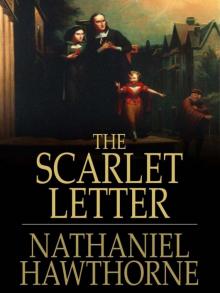 The Scarlet Letter
The Scarlet Letter Young Goodman Brown : By Nathaniel Hawthorne - Illustrated
Young Goodman Brown : By Nathaniel Hawthorne - Illustrated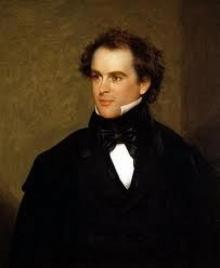 The Birthmark
The Birthmark The Marble Faun; Or, The Romance of Monte Beni - Volume 1
The Marble Faun; Or, The Romance of Monte Beni - Volume 1 The Minister's Black Veil
The Minister's Black Veil The Great Stone Face, and Other Tales of the White Mountains
The Great Stone Face, and Other Tales of the White Mountains The House of the Seven Gables
The House of the Seven Gables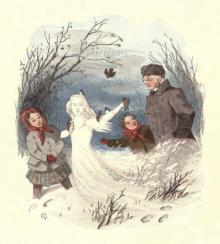 The Snow Image
The Snow Image The Blithedale Romance
The Blithedale Romance Rappaccini's Daughter: By Nathaniel Hawthorne - Illustrated
Rappaccini's Daughter: By Nathaniel Hawthorne - Illustrated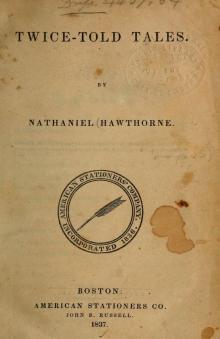 Twice-Told Tales
Twice-Told Tales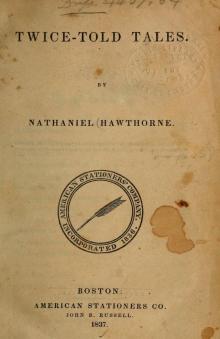 Twice Told Tales
Twice Told Tales The Marble Faun; Or, The Romance of Monte Beni - Volume 2
The Marble Faun; Or, The Romance of Monte Beni - Volume 2_preview.jpg) Footprints on the Sea-Shore (From Twice Told Tales)
Footprints on the Sea-Shore (From Twice Told Tales) Main Street
Main Street_preview.jpg) The Seven Vagabonds (From Twice Told Tales)
The Seven Vagabonds (From Twice Told Tales) Fanshawe
Fanshawe Chippings with a Chisel
Chippings with a Chisel Selected Tales and Sketches
Selected Tales and Sketches Young Goodman Brown
Young Goodman Brown Roger Malvin's Burial
Roger Malvin's Burial The Prophetic Pictures
The Prophetic Pictures The Village Uncle
The Village Uncle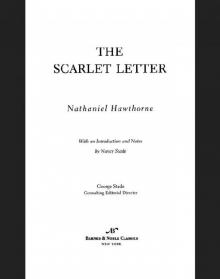 Scarlet Letter (Barnes & Noble Classics Series)
Scarlet Letter (Barnes & Noble Classics Series) The Procession of Life
The Procession of Life Drowne's Wooden Image
Drowne's Wooden Image Hawthorne's Short Stories
Hawthorne's Short Stories My Kinsman, Major Molineux
My Kinsman, Major Molineux Legends of the Province House
Legends of the Province House Foot-Prints on the Sea-Shore
Foot-Prints on the Sea-Shore The Haunted Quack
The Haunted Quack Tanglewood Tales
Tanglewood Tales The Seven Vagabonds
The Seven Vagabonds Mosses from an Old Manse, Volume 2
Mosses from an Old Manse, Volume 2 The Canterbury Pilgrims
The Canterbury Pilgrims Wakefield
Wakefield The Gray Champion
The Gray Champion The White Old Maid
The White Old Maid The Snow-Image: A Childish Miracle
The Snow-Image: A Childish Miracle The Gentle Boy
The Gentle Boy Mr. Higginbotham's Catastrophe
Mr. Higginbotham's Catastrophe![The Threefold Destiny: A Fairy Legend, by Ashley Allen Royce [pseud.] Read online](http://i1.bookreadfree.com/i2/04/10/the_threefold_destiny_a_fairy_legend_by_ashley_allen_royce_pseud__preview.jpg) The Threefold Destiny: A Fairy Legend, by Ashley Allen Royce [pseud.]
The Threefold Destiny: A Fairy Legend, by Ashley Allen Royce [pseud.] Lady Eleanore`s Mantle
Lady Eleanore`s Mantle The Great Carbuncle
The Great Carbuncle The Portable Hawthorne (Penguin Classics)
The Portable Hawthorne (Penguin Classics) True Stories from History and Biography
True Stories from History and Biography